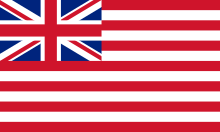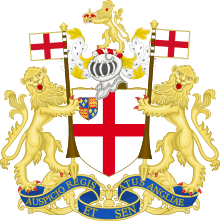
Back Britse Oos-Indiese Kompanjie Afrikaans Ēastindea Tēoh ANG ईस्ट इंडिया कंपनी ANP شركة الهند الشرقية Arabic ইষ্ট ইণ্ডিয়া কোম্পানী Assamese Compañía Británica de les Indies Orientales AST Ost-Hind şirkəti (Böyük Britaniya) Azerbaijani بریتانیانین دوغو هیندوستان شیرکتی AZB Брытанская Ост-Індская кампанія Byelorussian Британска източноиндийска компания Bulgarian
 Company flag (1801) | |
 Coat of arms (1698) Motto: Auspicio Regis et Senatus Angliae Latin for "By command of the King and Parliament of England" | |
| Company type | Public State-owned enterprise[1] |
|---|---|
| Industry | International trade |
| Founded | 31 December 1600 |
| Founders |
|
| Defunct | 1 June 1874 |
| Fate | Nationalised:
|
| Headquarters | East India House, , |
| Products | Cotton, silk, indigo dye, sugar, salt, spices, saltpetre, tea, slave trade and opium |
The East India Company (EIC)[a] was an English, and later British, joint-stock company founded in 1600 and dissolved in 1874.[4] It was formed to trade in the Indian Ocean region, initially with the East Indies (the Indian subcontinent and Southeast Asia), and later with East Asia. The company gained control of large parts of the Indian subcontinent and colonised parts of Southeast Asia and Hong Kong. At its peak, the company was the largest corporation in the world by various measures and had its own armed forces in the form of the company's three presidency armies, totalling about 260,000 soldiers, twice the size of the British army at the time.[5]
Originally chartered as the "Governor and Company of Merchants of London Trading into the East-Indies",[6][7] the company rose to account for half of the world's trade during the mid-1700s and early 1800s,[8] particularly in basic commodities including cotton, silk, indigo dye, sugar, salt, spices, saltpetre, tea, and later, opium. The company also initiated the beginnings of the British Empire in India.[8][9]
The company eventually came to rule large areas of India, exercising military power and assuming administrative functions. Company-ruled areas in India gradually expanded after the Battle of Plassey in 1757 and by 1858 most of modern India, Pakistan, and Bangladesh was either ruled by the company or princely states closely tied to it by treaty. Following the Indian Rebellion of 1857, the Government of India Act 1858 led to the British Crown assuming direct control of India in the form of the new British Raj.[10]
The company subsequently experienced recurring problems with its finances, despite frequent government intervention. The company was dissolved in 1874 under the terms of the East India Stock Dividend Redemption Act enacted one year earlier, as the Government of India Act had by then rendered it vestigial, powerless, and obsolete. The official government machinery of the British Raj had assumed its governmental functions and absorbed its armies.
- ^ Cite error: The named reference
topic/Eastwas invoked but never defined (see the help page). - ^ Carey, W. H. (1882). 1882 – The Good Old Days of Honourable John Company. Simla: Argus Press. Archived from the original on 23 September 2015. Retrieved 30 July 2015.
- ^ "Company Bahadur". Encyclopaedia Britannica. Archived from the original on 9 December 2018. Retrieved 8 December 2018.
- ^ "Not many days ago the House of Commons passed". Times. London. 8 April 1873. p. 9.
- ^ Roos, Dave (23 October 2020). "How the East India Company Became the World's Most Powerful Monopoly". History. Retrieved 29 April 2022.
- ^ Scott, William. "East India Company, 1817–1827". Archives Hub. Senate House Library Archives, University of London. Archived from the original on 21 September 2019. Retrieved 20 September 2019.
- ^ Parliament of England (31 December 1600). – via Wikisource.
Governor and Company of Merchants of London Trading into the East-Indies
- ^ a b Farrington, Anthony (2002). Trading Places: The East India Company and Asia 1600–1834. British Library. ISBN 9780712347563. Archived from the original on 27 July 2020. Retrieved 21 September 2019.
- ^ "Books associated with Trading Places – the East India Company and Asia 1600–1834, an Exhibition". Archived from the original on 30 March 2014.
- ^ Cite error: The named reference
Conquestswas invoked but never defined (see the help page).
Cite error: There are <ref group=lower-alpha> tags or {{efn}} templates on this page, but the references will not show without a {{reflist|group=lower-alpha}} template or {{notelist}} template (see the help page).
© MMXXIII Rich X Search. We shall prevail. All rights reserved. Rich X Search